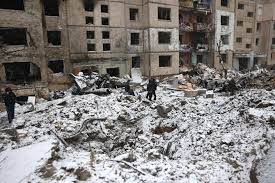Andrew Hammond
Late 2023 and early 2024 have seen growing European concern that Russia could yet prevail in the most serious conflict on the continent since the Second World War. Far from being the time to take its foot off the gas pedal, Europe must instead double down on its efforts to help Ukraine.
The stakes in play are massive and growing. Europe and the wider West still have a significant strategic interest in ensuring the best possible outcome for Kyiv. A potential Russian victory would only embolden Moscow and its allies across the world. Only last month, for instance, German Defense Minister Boris Pistorius warned of the possibility of further Russian aggression in Europe this decade, including against Georgia, Moldova and/or the Baltic states.
And it is not just security-related stakeholders making such comments. Also last month, International Monetary Fund Deputy Managing Director Gita Gopinath warned that the world is heading toward “cold war two” as a result of its geopolitical and geoeconomic fragmentation into two blocs: one in the West and a Russia and China-led grouping in the East.
One measure of the consequences of a Russian victory is that Moscow would move closer to controlling a quarter of global wheat exports. So, it is time for Europe to step up to the plate in what may be a very difficult year ahead.
Much of the first two years of the war has seen Kyiv, unexpectedly, on the counteroffensive. Moreover, Ukraine recaptured about half of its previously occupied territory in the period up to autumn last year. With both sides digging in for the cold winter months, making breakthroughs may become increasingly difficult – and it is Moscow that has reportedly made some recent territorial gains.
This will do little to ease the “fatigue” that Italian Prime Minister Giorgia Meloni said, in an unguarded moment late last year, is being experienced by some European leaders. She added: “We (are) near the moment in which everybody understands that we need a way out.”
Another factor that will do little to ease this fatigue is that sanctions may be doing as much damage to the West as they are to Russia. In 2023, the Russian economy is expected to have expanded by 2.8 percent, while some Western nations flatlined.
It is perhaps unsurprising, in that context, that freshly committed Western aid to Ukraine dropped nearly 90 percent from a year earlier, according to the Kiel Institute for the World Economy. This is even before last month, when the US and EU were unable to approve significant new funds for Kyiv because of Republican opposition in the US Congress and Hungary’s disagreements with Brussels.
Yet another challenge is the possible splintering of the political consensus behind President Volodymyr Zelensky’s leadership. While his approval rating remains high by international standards, trust in him fell to 76 percent in October from 91 percent in May, according to the Kyiv International Institute of Sociology. This comes in a context in which Moscow continues to put huge resources into its war effort. This includes massive military manpower. A total of 617,000 Russian troops are currently fighting, with some 244,000 of them being soldiers called up to fight alongside professional military troops.
All in all, this has given rise to Western speculation that Kyiv will not achieve all of its strategic war objectives. Take the example of Lord Ricketts, a former UK national security adviser. He believes there is a growing possibility of a Korea-style scenario, with Russia keeping control of about a fifth of prewar Ukraine and the remainder moving in a pro-Western direction in the years to come. This is why it is now so important that Europe redoubles its commitment, especially amid election uncertainty in the US that may see Donald Trump win out in November. The ex-president’s apparent disdain for Ukraine may leave a critical gap that only Europe and its Western allies, including Japan and Canada, can try to fill – at least partially.
What the EU has already done is to start to move forward with about half the previously promised aid of €50 billion ($54 billion) over the next four years. This is to give Kyiv more predictability for its strained budget.
However, much more thinking is needed about how the 27-member bloc and non-EU allies like the UK can best contribute to the resilience of Ukraine in the medium to long term. This includes military assistance, security guarantees and wider economic support, such as access to the EU’s massive single market.
A starting point for this future commitment, beyond the unprecedented support that Europe has provided so far, is Brussels moving forward with accession talks to allow Ukraine to potentially join the EU. Beyond that, the West can also put Kyiv onto a pathway to possible NATO membership. Moreover, important commitments can be made on reconstruction. The rebuilding of Ukraine may approximate that of Western Europe after the Second World War, Eastern Europe after the Cold War and the Western Balkans after the breakup of Yugoslavia. It will cost many hundreds of billions of euros and will be the most ambitious postwar reconstruction effort in the 21st century. This year is therefore the moment for Europe to double down on its commitment to Ukraine. The EU and other European powers such as the UK have huge incentives to support Kyiv in a difficult 2024, which may see yet more troubling news for Zelensky’s leadership.







